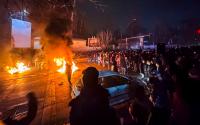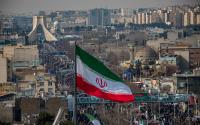3 December 2006Mary Riddell
The self-help industry is a marker on how Britain has changed in 25 years. Now, books on personal growth or beefed-up golf swings tell you how to enhance your life. Then, survival manuals were about hanging on to it. Here's an excerpt from a yellowing Cold War primer instructing citizens on what to do, should Armageddon come to Ponders End.
A sketch shows a man curled in a sandbagged cupboard. 'Hiding under the stairs may sound ridiculous,' the caption reads. 'But it could give protection if the house remained standing.' Obviously, chipboard has limited potential to deflect a multi-megaton nuclear warhead. You might as well try evening primrose oil as an antidote to polonium 210. Even so, government advised stockpiling Rice Krispies and filling baths with water. Duck and cover. Protect and survive. We were, quite possibly, going to die.
Public fear has billowed since then. If the terrorist does not get us, the home-grown hoodie might. A nation once braced for mass annihilation is now so panic-stricken after the poisoning of the Russian defector, Alexander Litvinenko, that a whiff of radiation on an inflight blanket seems like Hiroshima revisited. But, in an age of phobia, one terror has been expunged. No one fears a state-led nuclear strike.
And yet, the Prime Minister will tomorrow deliver a White Paper ushering in a replacement for the Trident missile system. The timetable for this Quixotic move was always rushed; now it looks frantic. There has been none of the informal discussion that preceded other contentious issues, such as tuition fees. Tony Blair may rue testing the patience of several Cabinet dissenters who are uneasy, or incandescent, about his likely preferred option: new submarines that may be fitted, in time, with souped-up, GPS-guided US missiles.
The tennis game of disarmament is familiar. Angela Carter, the novelist, concurred with Blair only insofar as she thought debate superfluous. For her, the sole question was: 'Do you really want your loved ones to be fried alive?' Carter preferred to think of Goya's 'black' pictures in the Prado, with their swollen, muddy faces and skies the colour of a bruise. His landscapes, 'incoherent with devastation', seemed to her to prefigure nuclear holocaust. What was left to say?
Quite a lot, if only parliamentary time permitted. A bill of £25bn (possibly up to £76bn) could save millions of malnourished children, meet Britain's carbon emission targets, or cover a minimum of eight cost-busting Olympic Games. When the defence budget cannot run to helicopters and even body armour, why reinvent a system that will have less place in modern conflict than slingshots and boiling lead? Trident Two, detectable by the tracking devices of future foes, will be obsolete before it hits the water. But gross waste of money is not the main issue.
Nor, even, is the bold case made by Charles Clarke, who thinks, quite rightly, that national security is ill-served by 'building weapons to fight the last war'. Some have anointed him a likely rebel-leader in the Commons. They may be disappointed. Clarke, for now, is chiefly arguing that resources would be better spent on countering terrorism, people-trafficking and organised crime. He may not see Trident as the cathartic issue on which to pin his political future.
When cost and fitness for purpose are not the clinching arguments, what is? Only this. The world is at stalemate. Old institutions, such as the UN and Nato, grow weak. Terror convulses tracts of the world and fear of it paralyses the rest. Among the embers of western military supremacy, a new nuclear arms race catches light. In what Kofi Annan called 'a cascade of proliferation', up to 30 nations could build a weapon within a decade. In this nuclear Wal-Mart, every aspiring dirty bomber can hope for crumbs.
If ever there was a time for Blair to weave his legacy, this is it. Britain could be a world leader again. It could argue for the UN to widen the Security Council, rather than restricting permanent places to the five powers of 1945. That move alone would crush the notion that the bomb, a 'prestige' item, is as vital to a top-table nation as a Louis Vuitton handbag to a WAG. Britain, if it wished, could lead negotiations to revitalise the creaking Nuclear Non-proliferation Treaty (NPT).
The pact's rule - that only those who renounce the bomb should get help with civilian nuclear power - is being wrenched apart, and not just by Iran. America demands that India must get nuclear arms on the odd grounds that, like Pakistan and Israel, it never bothered signing up to the NPT. Just when Britain should be promoting compliance, it risks embarking on a course that, lawyers say, will flout the international code.
It would be mad to suggest that British good example would instantly disarm the nuclear gurus of Tehran and Pyongyang. But the unspoken reasons for a new-generation bomb are madder still. We must not upset the arms industry or displease America. Why not, if the decision is right? We must have all the French have. But we get by without the Eiffel Tower or the recipe for Brie. Anyway, a cash-strapped, post-Chirac France may become less welded to its force de frappe
Here, there are halfway measures. A decision could be delayed, or stockpiles reduced. Scientists could keep up with technology and maintain a 'virtual' weapon, as the think-tank Basic suggested last week. But Japan, South Africa, even Belarus, are among the majority who have shunned the bomb or renounced it. Britain now has its last best chance to walk away, towards a safer world.
In the bloody opening chapter of this century, Trident Two may seem threatless. It would be, by definition, unusable since 'deterrence' fails in the moment a warhead is unleashed.
Yet nuclear bombs, artefacts in the museum of conflict, are also a nemesis-in-waiting. 'They [vicious states] can be absolutely confident that, in the right conditions, we would be prepared to use our nuclear weapons.' Not a dirty bomber's fantasy, but Geoff Hoon's vision, as Defence Secretary, of liberal intervention.
Bravado, maybe. Few think that Britain ever would, or could, unleash any strike. But neither is it safe to pre-write history in a time of nuclear boom and blighted reason. The world moves on, new dangers multiply and the government refights the Cold War. We are not stockpiling corned beef and sandbagging the garden shed. So why, exactly, are our leaders replacing Trident?
The clock is running on one of the gravest decisions this government will take. Parliament has a few weeks to mount a revolt. From Goya's bruised skies to the memorials of Nagasaki, there are no good omens for any nuclear tomorrow. It is not too late to cancel this one.
http://observer.guardian.co.uk/columnists/story/0,,1962769,00.html
#comments { font-size:70%; font-family:Geneva, Arial, Helvetica, sans-serif;}#comments div.commentheader p { font-size:1.2em;}#comments { clear:both; margin-top:25px; width:256px;}#comments h3 { color: #fff; padding:2px; margin-bottom: 10px; font-size:1.3em; background-color:#999;}.individualcomment { font-size:1.2em; clear:both; margin-top:10px; padding-top:10px; border-top:1px solid #999;}.dateline { font-weight: normal; color:#999; padding-top:2px; margin:0 0 15px 0;}.byline { font-weight:bold; padding:0; margin:0;}





